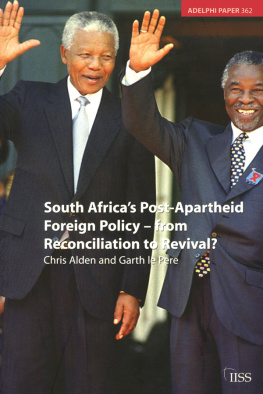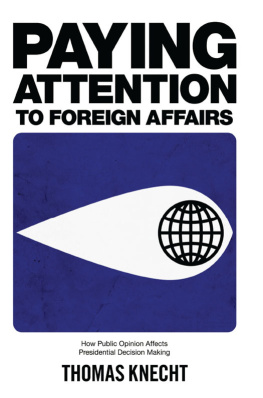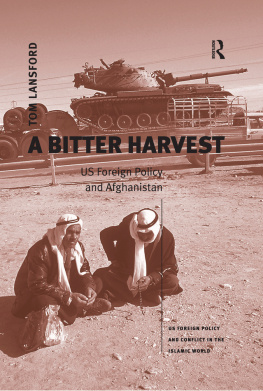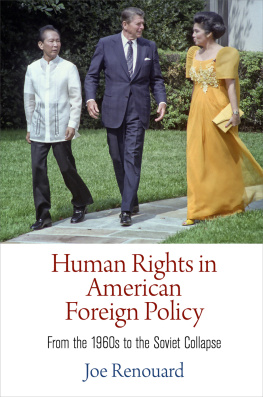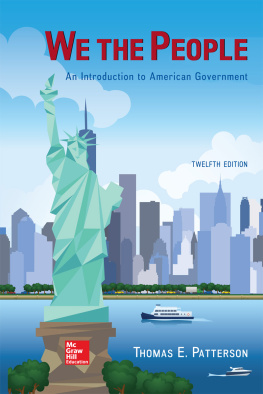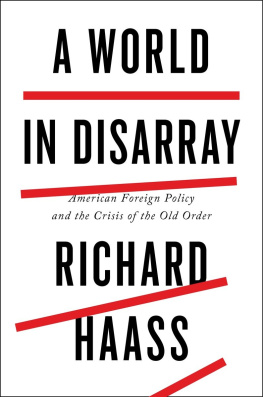First published 1997 by Ashgate Publishing
Reissued 2018 by Routledge
2 Park Square, Milton Park, Abingdon, Oxon, OX14 4RN
52 Vanderbilt Avenue, New York, NY 10017
Routledge is an imprint of the Taylor & Francis Group, an informa business
Copyright A.M. Thomas 1997
All rights reserved. No part of this book may be reprinted or reproduced or utilised in any form or by any electronic, mechanical, or other means, now known or hereafter invented, including photocopying and recording, or in any information storage or retrieval system, without permission in writing from the publishers.
Notice:
Product or corporate names may be trademarks or registered trademarks, and are used only for identification and explanation without intent to infringe.
Publishers Note
The publisher has gone to great lengths to ensure the quality of this reprint but points out that some imperfections in the original copies may be apparent.
Disclaimer
The publisher has made every effort to trace copyright holders and welcomes correspondence from those they have been unable to contact.
A Library of Congress record exists under LC control number: 97071459
ISBN 13: 978-1-138-39020-1 (hbk)
ISBN 13: 978-0-429-42345-1 (ebk)
Most Americans believe that the United States has a unique mission in the world-to set an example to others not only how a country ought to be governed but also how it should conduct its foreign relations. The vision of the city upon a hill remains with Americans to this day. Americans also regard their country to be the champion of ideals like equality, liberty and justice. The spirit and philosophy of these ideals were reflected not only in the Declaration of Independence, the Constitution and the Gettysburg Address, but also in the speeches and writings of most American leaders. The observance of these ideals was urged both in domestic political life as well as in the conduct of foreign relations. Moreover, these values were thought to have universal applicability, and other nations were exhorted to adhere to them. It is in this regard that South Africa posed a serious dilemma to the United States. Apartheid, the doctrine of racialism which was based on the idea of the superiority of the White race, had been practised for decades in South Africa. The policy of apartheid was devised by the White minority to ensure its survival and protect itself against unanticipated vicissitudes. Segregation and discrimination were observed in all walks of life and enforced by legislation. For the non-Whites who constituted the majority, its impact was disastrous and deprived them of any control over their lives.
For several decades apartheid remained a familiar and oft-quoted word in international circles, one which touched the conscience and stirred the passions of millions around the world. It became the subject of debate in hundreds of forums and incurred the opprobrium of the civilised world. While the rest of the world had accepted the idea of racial equality, South Africa gave racial discrimination a philosophical basis and legal sanction. South Africa not only discriminated against certain sections of its population and deprived them of their basic human rights but also sought to justify this on the grounds that separation of races was natural.
Defenders of apartheid questioned the rationale of South Africa alone being criticised for discriminating against its citizens. They cited countless instances of discrimination and denial of rights by states against individuals and groups on ethnic and other grounds. It is true that cases of discrimination and persecution exist elsewhere in the world. Moreover, in any society there is often some degree of inequality. But it would be illogical to compare these cases with the South African one. In none of the other countries had the principle of racial inequality been legally enshrined. Inequality has often been the product of history, but it has not been justified or perpetuated for that reason. Pseudo-racial theories have been propounded from time to time, but no modern state has accepted them, apart from instances like that of Nazi Germany. Apartheid was one of the most noxious forms assumed by slavery in modern times and constituted one of the most severe and atrocious violations of human rights. South Africa sought to insulate itself from international opinion and opprobrium. It resisted global efforts on the ground that its policies were a domestic concern and that such efforts constituted an interference in its internal affairs. The international community on the other hand regarded apartheid no longer a domestic concern but one with international dimensions and repercussions. Furthermore, in the case of South Africa it was widely acknowledged that the case for racial justice transcended the claims of international law.
Apartheid thus being undeniably the antithesis of American ideals, the United States was naturally expected to oppose it in unequivocal terms. However, the United States had significant tangible interests, specifically economic and strategic, in South Africa, which played a decisive role in shaping American policy. South Africa had the most developed economy in the entire African continent and was the repository of several important minerals. Its geographic and strategic location was also of great importance to the United States. Consequently, the entire issue placed the United States in a predicament. On the one hand it had to adhere to its ideals, while on the other refrain from alienating the South African regime and damaging its interests. Whichever course it resorted to, there were corresponding repercussions.
It is in this context that a study of American responses-of perceptions and policies towards South Affica-assumes significance. There had always been an intense debate during the days of apartheid over United States policy towards South Africa. This book endeavours to examine United States policy towards South Africa in the broader context of American ideals and responses to apartheid. In order to facilitate a thorough analysis, the focus of the book has been limited to the nineteen seventies, or more precisely from 1969 to 1980, covering a period of three administrations, those of Nixon, Ford and Carter.
The developments within South Africa were largely ignored by American administrations for a long time. However, dining the nineteen fifties, with apartheid becoming an issue of international concern, and the question being raised at the United Nations, the United States began displaying some interest in the racial crisis in South Africa. With the Sharpville massacre of 1960, when about seventy Blacks were killed in police firing, American interest was suddenly kindled, but the following decade was witness to mere verbal interventionism rather than concrete measures. At the United Nations, the United States supported mildly worded resolutions and half-measures, but continued its relations with South Africa unhindered. The international demand for economic sanctions against South Africa always found one of its foremost opponents in the United States. Maintaining cordial relations with South Africa, notwithstanding the nature of the apartheid system, was considered to be in the best interests of the United States. Thus by 1968 the failure of any sincere American effort to address the South African issue was evident.
The period under study was particularly significant for the United States both in the domestic and international spheres. The beginning of the nineteen seventies witnessed an increasing interest and articulation on South African issues within the United States, particularly by Afro-Americans who had just achieved civil and voting rights. At the international level, with the advent of detente and the relaxation of tensions, the United States could focus more attention on problems like that of apartheid in South Africa.


